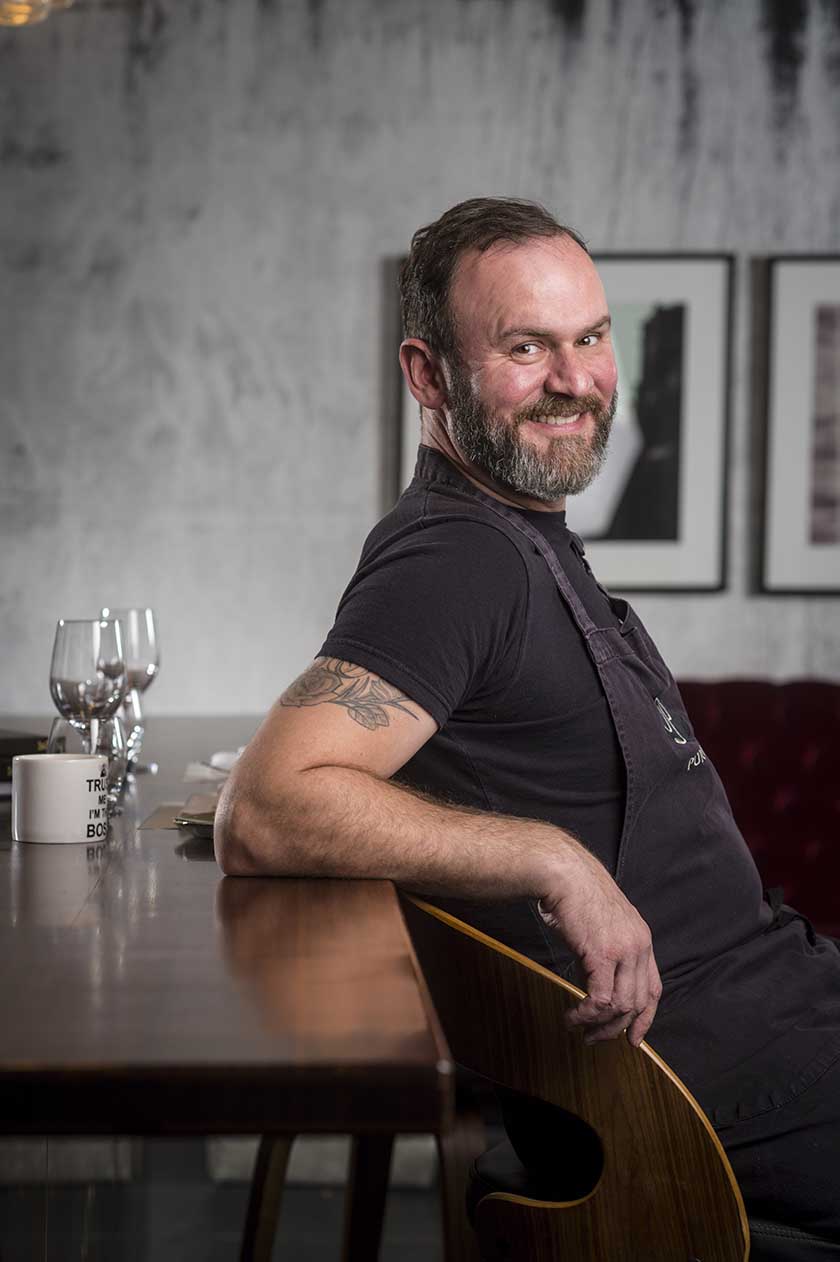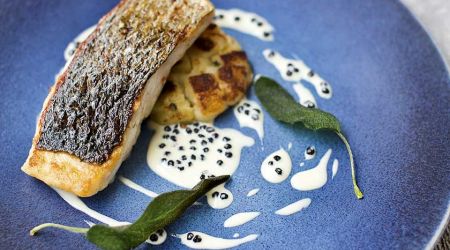Glynn Purnell
He’s the affable Brummie done good who’s equally at home cracking jokes as well as yolks on TV. But he’s also a passionate nonconformist with strong views on food fads and a serious supporter of his city, discovers Mark Sansom
Glynn Purnell is a funny man. Self-deprecating, witty and with a string of one-liners that a stadium-filling comedians would do well to borrow, the character you’ll recognise from TV is as you find him in real life. There’s no edge of arrogance; no sense of superciliority, though his eyes reveal an intensity that can switch from well-mannered joker to serious hard-case with a clench of the jaw and flick of his well-manicured salt-and-pepper beard.
No one conveys humour on the plate better than Purnell. Hundreds try, nearly all fail. Every other dish on his tasting menu at his central Birmingham restaurant Purnell’s does enough to raise a smile. There’s a cheese and pineapple taco that conjures images of tinfoil-covered cocktail-stick hedgehogs from questionable buffet tables up and down the UK, and a burnt-custard egg surprise – which won him the first of two places at the Great British Menu banquet back in 2008 – that brings fun in spades.
‘I tried to take it off the menu once, but I got lynched,’ he recounts in that helter-skelter Brummie brogue of his. ‘Each dish on that menu means something to me. It might come from my childhood on the estate, or it might come from last night when I got into my car and wiped the autumn leaves away from my windscreen. I put real life on a plate.’
We’re barely five minutes into the interview before Purnell mentions his upbringing. Now aged 40 with three children of his own – Oliver, 10; Esme, 7; and Vincent, 4 – he seems keen to reflect on the impact it had on him. ‘I grew up in the kind of house where I’d wake up with ice on the inside of the window. The estate was my playground and fishing trips with my dad to the local river were the equivalent of a family holiday. Times were just as tight when it came to the dinner table.’
Does a chastened upbringing reflect in his food? Is that why he uses cheap cuts on his menus? He bristles before responding: ‘Calling them cheap cuts doesn’t do them justice. If you ask me what tastes better out of a fillet steak and a slow-roasted ox cheek, I’ll say cheek every time.’ I can’t help but agree.
‘But yes, the way my mum made the most of ingredients and her style of food is with me today,’ he continues. “The dish that means the most to me is my haddock and eggs with cornflakes. My mum used to poach the haddock in milk and throw the liquor away. To me, the milk tasted better than the fish. When she wasn’t looking I’d grab a handful of cornflakes, stuff them in my pocket and eat them outside with the warm milk. It’s a flavour combination that resonates and still appeals to me today, only on the menu now I poach the fish and create a cornflake crumb to make it look a bit sexier than it did when I was eating from my hand and drinking from a cracked cup on the street.’
There’s been a change from scrappy schoolboy to the chef-patron of today. Where did his inspiration come from? ‘Claude Bosi,’ he says, not missing a beat. ‘I only had a season with the man, but what he showed me in terms of passion and how to develop personality through food did more for me than anyone else.’
After time at Bosi’s two-star Hibiscus, he went to Jessica’s in the slightly less-salubrious Edgbasaton. ‘We were smack-bang in the red light district. A local journalist nicknamed Jessica’s the Lady of The Night, and it was bang on. A decent restaurant on the wrong side of the tracks.’ He doesn’t do himself justice. Jessica’s co-won Birmingham one of its first two Michelin stars in 2005 (the other recipient was Simpsons, also in Edgbaston), and for the first time, critics and travelling gourmands began to consider Britain’s second city as a serious dining destination. He clearly enjoyed it, but looks back on his time there with marginal regret: ‘I’m a big dude. When I was there I was probably quite aggressive. I wanted people to be as passionate as I was about putting my hometown on the map. Maybe sometimes it came across in the wrong way.’
Now, he has other ways to channel his aggression. Purnell kickboxes twice a week and has had a number of white-collar boxing bouts. As he’s telling me this, he whips out his phone to show me a video of a spinning roundhouse kick that dispatched an opponent and won him a silver medal in a national competition. He follows this with a close-up image of a perfectly timed right hook from which he knew his adversary ‘wasn’t getting up’. I’d hate to know what he does after a bad review. Luckily there aren’t too many.
Are there any chefs that he’d like to stand toe to toe with? ‘Sat Bains. He’s a great mate, but he knows I’d deal with him. But forget all that – the hairdryer treatment in the kitchen doesn’t work for everyone. Now I’ll just ask a chef if he thinks it’s good enough?’ He drops his voice to a tone only audible to dogs: ‘Being softly spoken can be just as effective.’ I can attest that he’s absolutely right.
He’s got more than a few stories to tell from his younger days: ‘They called me Glenda at my first job as I had long black hair. I didn’t mind that, but the chef de partie I was working for as commis was an absolute nightmare. One day, I was making a blackcurrant sauce and he just wouldn’t let up. He followed me to the walk-in fridge and kept on, so I hit him. He left shortly after and I took his job.’ I venture that it’s a career decision that probably wouldn’t have worked in any other industry. ‘Yes, but this isn’t any other industry. Chefs are nutters.’
After four years at Jessica’s, Purnell was offered the new site for his eponymous restaurant in 2007. ‘I remortgaged my house, leveraged everything I could, and begged and borrowed to get enough capital to take the lease. It was my dream to be a chef-patron, and in spite of the sleepless nights and penny-pinching early on, I don’t regret a second. It allows me to do things my way and do what is right in my kitchen.’
Purnell is very much a trailblazer in the way he manages his team. You may have heard in the national news last month that Michel Roux Jr has closed Le Gavroche on Mondays to ensure his staff get two full days off a week; Purnell has been doing it for years. ‘We also shut the restaurant between mid-December and early January so everyone gets a proper break. Burn out, not pay is the biggest problem affecting chefs, and if I know my team is rested, I’ll be getting their best work and they won’t be looking around.’
In his kitchen hangs a board bearing his motto ‘TO BE THE FASHION IS NOT TO BE THE FASHION’ in huge black type. It’s an ethos that extends beyond the pass: ‘There are too many people trying to copy Noma and the like. Foraging sounds good, but if I went out around Birmingham, all I’d get would be dog crap and a crisp packet. To be honest, the majority of foraged herbs don’t taste that good anyway.’ He’s got similar trend-bucking, non-conformist views on local produce and seasonality: ‘I’ll sacrifice local for quality every day of the week. My venison comes from the Balmoral Estate because it’s the best. Why should I compromise for something down the road when it’s not as good? A lot of what people say about seasonality is bullshit and mirrors, too – just be honest about what you’re serving. Diners need to wise up to it.’
So opening a restaurant with rooms by the New Forest isn’t for him? ‘I’m Birmingham through and through, mate. I could’ve gone to Mayfair and won stars down there, but I want to put this place on the map. I predicted in 2005 that we’d have at least five one-stars and one two-star. I was right about the first part, but we’re waiting on the two-star.’ Should it be him? ‘A full restaurant means more to me than stars, any day. I’d like to open a freehold in the countryside near where I live, but it’s a bit like second-album syndrome, isn’t it?’
Though with debut singles like his, a greatest hits won’t go amiss.‘If I make a hash of it, the vultures won’t be far away.’
Birds of prey or no, those vultures would be best advised to maintain a wide berth.

Recipes
Get Premium access to all the latest content online
Subscribe and view full print editions online... Subscribe


